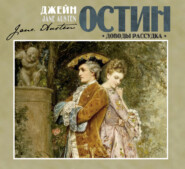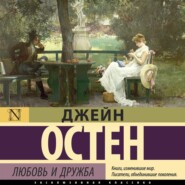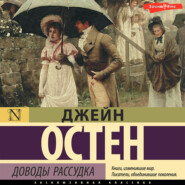По всем вопросам обращайтесь на: info@litportal.ru
(©) 2003-2025.
✖
Mansfield Park
Настройки чтения
Размер шрифта
Высота строк
Поля
‘This is insufferably hot,’ said Miss Crawford, when they had taken one turn on the terrace, and were drawing a second time to the door in the middle which opened to the wilderness. ‘Shall any of us object to being comfortable? Here is a nice little wood, if one can but get into it. What happiness if the door should not be locked! but of course it is; for in these great places the gardeners are the only people who can go where they like.’
The door, however, proved not to be locked, and they were all agreed in turning joyfully through it, and leaving the unmitigated glare of day behind. A considerable flight of steps landed them in the wilderness, which was a planted wood of about two acres, and though chiefly of larch and laurel, and beech cut down, and though laid out with too much regularity, was darkness and shade, and natural beauty, compared with the bowling-green and the terrace. They all felt the refreshment of it, and for some time could only walk and admire. At length, after a short pause, Miss Crawford began with, ‘So you are to be a clergyman, Mr Bertram. This is rather a surprise to me.’
‘Why should it surprise you? You must suppose me designed for some profession, and might perceive that I am neither a lawyer, nor a soldier, nor a sailor.’
‘Very true; but, in short, it had not occurred to me. And you know there is generally an uncle or a grandfather to leave a fortune to the second son.’
‘A very praiseworthy practice,’ said Edmund, ‘but not quite universal. I am one of the exceptions, and being one, must do something for myself.’
‘But why are you to be a clergyman? I thought that was always the lot of the youngest, where there were many to choose before him.’
‘Do you think the church itself never chosen, then?’
‘Never is a black word. But yes, in the never of conversation, which means not very often, I do think it. For what is to be done in the church? Men love to distinguish themselves, and in either of the other lines distinction may be gained, but not in the church. A clergyman is nothing.’
‘The nothing of conversation has its gradations, I hope, as well as the never. A clergyman cannot be high in state or fashion. He must not head mobs, or set the tone in dress. But I cannot call that situation nothing which has the charge of all that is of the first importance to mankind, individually or collectively considered, temporally and eternally, which has the guardianship of religion and morals, and consequently of the manners which result from their influence. No one here can call the office nothing. If the man who holds it is so, it is by the neglect of his duty, by forgoing its just importance, and stepping out of his place to appear what he ought not to appear.’
‘You assign greater consequence to the clergyman than one has been used to hear given, or than I can quite comprehend. One does not see much of this influence and importance in society, and how can it be acquired where they are so seldom seen themselves? How can two sermons a week, even supposing them worth hearing, supposing the preacher to have the sense to prefer Blair’s to his own, do all that you speak of? govern the conduct and fashion the manners of a large congregation for the rest of the week? One scarcely sees a clergyman out of his pulpit.’
‘You are speaking of London, I am speaking of the nation at large.’
‘The metropolis, I imagine, is a pretty fair sample of the rest.’
‘Not, I should hope, of the proportion of virtue to vice throughout the kingdom. We do not look in great cities for our best morality. It is not there that respectable people of any denomination can do most good; and it certainly is not there that the influence of the clergy can be most felt. A fine preacher is followed and admired; but it is not in fine preaching only that a good clergyman will be useful in his parish and his neighbourhood, where the parish and neighbourhood are of a size capable of knowing his private character, and observing his general conduct, which in London can rarely be the case. The clergy are lost there in the crowds of their parishioners. They are known to the largest part only as preachers. And with regard to their influencing public manners, Miss Crawford must not misunderstand me, or suppose I mean to call them the arbiters of good breeding, the regulators of refinement and courtesy, the masters of the ceremonies of life. The manners I speak of might rather be called conduct, perhaps, the result of good principles; the effect, in short, of those doctrines which it is their duty to teach and recommend; and it will, I believe, be everywhere found, that as the clergy are, or are not what they ought to be, so are the rest of the nation.’
‘Certainly,’ said Fanny, with gentle earnestness.
‘There,’ cried Miss Crawford, ‘you have quite convinced Miss Price already.’
‘I wish I could convince Miss Crawford too.’
‘I do not think you ever will,’ said she, with an arch smile; ‘I am just as much surprised now as I was at first that you should intend to take orders. You really are fit for something better. Come, do change your mind. It is not too late. Go into the law.’
‘Go into the law! With as much ease as I was told to go into this wilderness.’
‘Now you are going to say something about law being the worst wilderness of the two, but I forestall you; remember, I have forestalled you.’
‘You need not hurry when the object is only to prevent my saying a bon-mot, for there is not the least wit in my nature. I am a very matter-of-fact, plain-spoken being, and may blunder on the borders of a repartee for half an hour together without striking it out.’
A general silence succeeded. Each was thoughtful, Fanny made the first interruption by saying, ‘I wonder that I should be tired with only walking in this sweet wood; but the next time we come to a seat, if it is not disagreeable to you, I should be glad to sit down for a little while.’
‘My dear Fanny,’ cried Edmund, immediately drawing her arm within his, ‘how thoughtless I have been! I hope you are not very tired. Perhaps,’ turning to Miss Crawford, ‘my other companion may do me the honour of taking an arm.’
‘Thank you, but I am not at all tired.’ She took it, however, as she spoke, and the gratification of having her do so, of feeling such a connection for the first time, made him a little forgetful of Fanny. ‘You scarcely touch me,’ said he. ‘You do not make me of any use. What a difference in the weight of a woman’s arm from that of a man! At Oxford I have been a good deal used to have a man lean on me for the length of a street, and you are only a fly in the comparison.’
‘I am really not tired, which I almost wonder at; for we must have walked at least a mile in this wood. Do not you think we have?’
‘Not half a mile,’ was his sturdy answer; for he was not yet so much in love as to measure distance, or reckon time, with feminine lawlessness.
‘Oh! you do not consider how much we have wound about, We have taken such a very serpentine course, and the wood itself must be half a mile long in a straight line, for we have never seen the end of it yet since we left the first great path.’
‘But if you remember, before we left that first great path, we saw directly to the end of it. We looked down the whole vista, and saw it closed by iron gates, and it could not have been more than a furlong in length.’
‘Oh! I know nothing of your furlongs, but I am sure it is a very long wood, and that we have been winding in and out ever since we came into it; and, therefore, when I say that we have walked a mile in it, I must speak within compass.’
‘We have been exactly a quarter of an hour here,’ said Edmund, taking out his watch. ‘Do you think we are walking four miles an hour?’
‘Oh! do not attack me with your watch. A watch is always too fast or too slow. I cannot be dictated to by a watch.’
A few steps farther brought them out at the bottom of the very walk they had been talking of; and standing back, well shaded and sheltered, and looking over a ha-ha into the park, was a comfortable-sized bench on which they all sat down.
‘I am afraid you are very tired, Fanny,’ said Edmund, observing her; ‘why would not you speak sooner? This will be a bad day’s amusement for you if you are to be knocked up. Every sort of exercise fatigues her so soon, Miss Crawford, except riding.’
‘How abominable in you, then, to let me engross her horse as I did all last week! I am ashamed of you and of myself, but it shall never happen again.’
‘Your attentiveness and consideration makes me more sensible of my own neglect. Fanny’s interest seems in safer hands with you than with me.’
‘That she should be tired now, however, gives me no surprise; for there is nothing in the course of one’s duties so fatiguing as what we have been doing this morning: seeing a great house, dawdling from one room to another, straining one’s eyes and one’s attention, hearing what one does not understand, admiring what one does not care for. It is generally allowed to be the greatest bore in the world, and Miss Price has found it so, though she did not know it.’
‘I shall soon be rested,’ said Fanny; ‘to sit in the shade on a fine day, and look upon verdure, is the most perfect refreshment.’
After sitting a little while, Miss Crawford was up again. ‘I must move,’ she said, ‘resting fatigues me. I have looked across the ha-ha till I am weary. I must go and look through that iron gate at the same view, without being able to see it so well.’
Edmund left the seat likewise. ‘Now, Miss Crawford, if you will look up the walk, you will convince yourself that it cannot be half a mile long, or half half a mile.’
‘It is an immense distance,’ said she; ‘I see that with a glance.’
He still reasoned with her, but in vain. She would not calculate, she would not compare. She would only smile and assert. The greatest degree of rational consistency could not have been more engaging, and they talked with mutual satisfaction. At last it was agreed that they should endeavour to determine the dimensions of the wood by walking a little more about it. They would go to one end of it, in the line they were then in (for there was a straight green walk along the bottom by the side of the ha-ha), and perhaps turn a little way in some other direction, if it seemed likely to assist them, and be back in a few minutes. Fanny said she was rested, and would have moved too, but this was not suffered. Edmund urged her remaining where she was with an earnestness which she could not resist, and she was left on the bench to think with pleasure of her cousin’s care, but with great regret that she was not stronger. She watched them till they had turned the corner, and listened till all sound of them had ceased.
CHAPTER 10 (#ulink_986a19d5-a825-56b1-9117-93077a6168cb)
A quarter of an hour, twenty minutes, passed away, and Fanny was still thinking of Edmund, Miss Crawford, and herself, without interruption from any one. She began to be surprised at being left so long, and to listen with an anxious desire of hearing their steps and their voices again. She listened, and at length she heard; she heard voices and feet approaching; but she had just satisfied herself that it was not those she wanted, when Miss Bertram, Mr Rushworth, and Mr Crawford, issued from the same path which she had trod herself, and were before her.
‘Miss Price all alone!’ and ‘My dear Fanny, how comes this?’ were the first salutations. She told her story. ‘Poor dear Fanny,’ cried her cousin, ‘how ill you have been used by them! You had better have stayed with us.’
Then seating herself with a gentleman on each side, she resumed the conversation which had engaged them before, and discussed the possibility of improvements with much animation. Nothing was fixed on; but Henry Crawford was full of ideas and projects, and, generally speaking, whatever he proposed was immediately approved, first by her, and then by Mr Rushworth, whose principal business seemed to be to hear the others, and who scarcely risked an original thought of his own beyond a wish that they had seen his friend Smith’s place.
After some minutes spent in this way, Miss Bertram, observing the iron gate, expressed a wish of passing through it into the park, that their views and their plans might be more comprehensive. It was the very thing of all others to be wished, it was the best, it was the only way of proceeding with any advantage, in Henry Crawford’s opinion, and he directly saw a knoll not half a mile off, which would give them exactly the requisite command of the house. Go therefore they must to that knoll, and through that gate; but the gate was locked. Mr Rushworth wished he had brought the key; he had been very near thinking whether he should not bring the key; he was determined he would never come without the key again; but still this did not remove the present evil. They could not get through; and as Miss Bertram’s inclination for so doing did by no means lessen, it ended in Mr Rushworth’s declaring outright that he would go and fetch the key. He set off accordingly.
‘It is undoubtedly the best thing we can do now, as we are so far from the house already,’ said Mr Crawford, when he was gone.
‘Yes, there is nothing else to be done. But now, sincerely, do not you find the place altogether worse than you expected?’
‘No, indeed; far otherwise. I find it better, grander, more complete in its style, though that style may not be the best. And to tell you the truth,’ speaking rather lower, ‘I do not think that I shall ever see Sotherton again with so much pleasure as I do now. Another summer will hardly improve it to me.’
After a moment’s embarrassment the lady replied, ‘You are too much a man of the world not to see with the eyes of the world. If other people think Sotherton improved, I have no doubt that you will.’
‘I am afraid I am not quite so much the man of the world as might be good for me in some points. My feelings are not quite so evanescent, nor my memory of the past under such easy dominion as one finds to be the case with men of the world.’

















